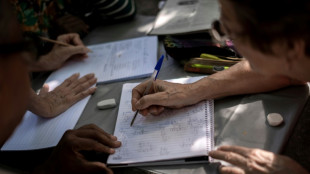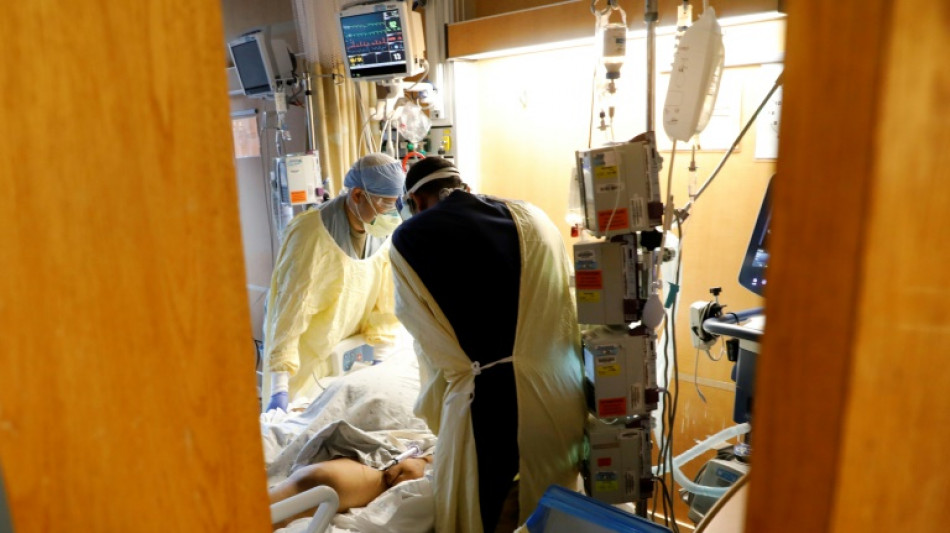
-
 Russell heads into home British GP haunted by Verstappen rumours
Russell heads into home British GP haunted by Verstappen rumours
-
Djokovic wary of Evans threat, Krejcikova worships at 'temple of tennis'

-
 Drought-hit Morocco turns to desalination to save vegetable bounty
Drought-hit Morocco turns to desalination to save vegetable bounty
-
Steve Smith back for second West Indies Test after dislocated finger

-
 Asian stocks mixed as traders shrug at US-Vietnam trade deal
Asian stocks mixed as traders shrug at US-Vietnam trade deal
-
Holland completes All Blacks 'great story' to debut against France

-
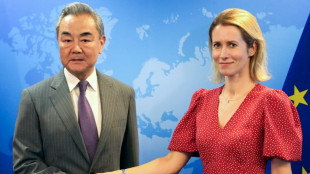 China, EU should not 'seek confrontation': FM Wang
China, EU should not 'seek confrontation': FM Wang
-
'Big Comrade': Former defence chief takes reins as Thai PM

-
 4 dead, 38 missing after ferry sinks on way to Indonesia's Bali
4 dead, 38 missing after ferry sinks on way to Indonesia's Bali
-
Thailand set for another acting PM after cabinet reshuffle
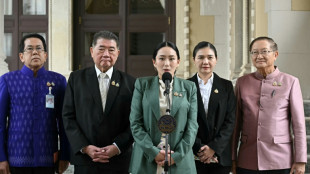
-
 In US capital, Trump tariffs bite into restaurant profits
In US capital, Trump tariffs bite into restaurant profits
-
Sean Combs: music pioneer, entrepreneur -- and convicted felon

-
 In California, fear of racial profiling grips Latino communities
In California, fear of racial profiling grips Latino communities
-
Home-grown players delight Wimbledon fans on hunt for 'new Andy Murray'

-
 Third-ever confirmed interstellar object blazing through Solar System
Third-ever confirmed interstellar object blazing through Solar System
-
Joao Pedro arrival boosts Chelsea ahead of Palmeiras Club World Cup test

-
 Lions start to roar in ominous Wallabies warning
Lions start to roar in ominous Wallabies warning
-
Kellaway, Tupou headline Waratahs team to face Lions

-
 Four All Blacks debutants to face France in first Test
Four All Blacks debutants to face France in first Test
-
Ukraine scrambling for clarity as US downplays halt to arms shipments

-
 Peru clinic that leaked Shakira medical record given hefty fine
Peru clinic that leaked Shakira medical record given hefty fine
-
UK's Starmer backs finance minister after tears in parliament

-
 Trump tax bill stalled by Republican rebellion in Congress
Trump tax bill stalled by Republican rebellion in Congress
-
US stocks back at records as oil prices rally
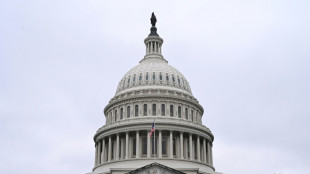
-
 Norway battle back to beat Swiss hosts in Euro 2025 opener
Norway battle back to beat Swiss hosts in Euro 2025 opener
-
Netanyahu vows to uproot Hamas as ceasefire proposals are discussed

-
 Tarvet won't turn pro yet, despite pushing Alcaraz at Wimbledon
Tarvet won't turn pro yet, despite pushing Alcaraz at Wimbledon
-
Ukraine left scrambling after US says halting some arms shipments

-
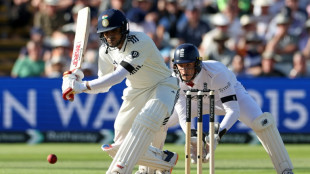 India captain Gill's hundred repels England in second Test
India captain Gill's hundred repels England in second Test
-
Possible interstellar object spotted zooming through Solar System

-
 Alcaraz ends Tarvet's Wimbledon adventure, Paolini crashes out
Alcaraz ends Tarvet's Wimbledon adventure, Paolini crashes out
-
Why is there no life on Mars? Rover finds a clue

-
 Former finalist Paolini stunned as Wimbledon seeds continue to fall
Former finalist Paolini stunned as Wimbledon seeds continue to fall
-
Tesla reports lower car sales, extending slump

-
 Finland open Women's Euro 2025 with win over Iceland
Finland open Women's Euro 2025 with win over Iceland
-
India captain Gill hits another hundred against England in 2nd Test
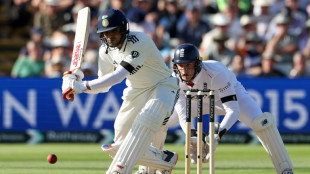
-
 Hamas mulls truce proposals after Trump Gaza ceasefire push
Hamas mulls truce proposals after Trump Gaza ceasefire push
-
Alcaraz ends Tarvet's Wimbledon adventure, Sabalenka advances

-
 Tears, prayers, exultation: Diddy radiates relief after partial acquittal
Tears, prayers, exultation: Diddy radiates relief after partial acquittal
-
Ruthless Alcaraz ends Tarvet's Wimbledon fairytale

-
 Bangladesh collapse in ODI series opener to hand Sri Lanka big win
Bangladesh collapse in ODI series opener to hand Sri Lanka big win
-
Trump says Vietnam to face 20% tariff under 'great' deal

-
 US senator urges bribery probe over Trump-Paramount settlement
US senator urges bribery probe over Trump-Paramount settlement
-
Nazi-sympathising singer's huge gig to paralyse Zagreb

-
 Germany swelters as European heatwave moves eastwards
Germany swelters as European heatwave moves eastwards
-
Sabalenka tells troubled Zverev to talk to family about mental health issues
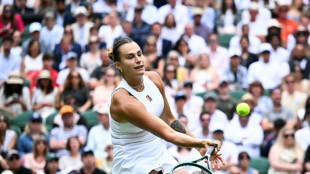
-
 Hong Kong govt proposes limited recognition of same-sex couples' rights
Hong Kong govt proposes limited recognition of same-sex couples' rights
-
Wall Street shrugs off drop US private sector jobs
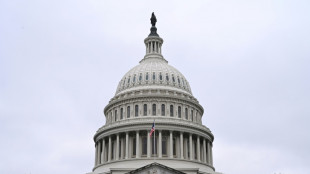
-
 Spain star Bonmati recovering well from meningitis, says coach Tome
Spain star Bonmati recovering well from meningitis, says coach Tome
-
Pogacar must 'battle' for Tour de France title says director


'AI doctor' better at predicting patient outcomes, including death
Artificial intelligence has proven itself useful in reading medical imaging and even shown it can pass doctors' licensing exams.
Now, a new AI tool has demonstrated the ability to read physicians' notes and accurately anticipate patients' risk of death, readmission to hospital, and other outcomes important to their care.
Designed by a team at NYU Grossman School of Medicine, the software is currently in use at the university's affiliated hospitals throughout New York, with the hope that it will become a standard part of health care.
A study on its predictive value was published Wednesday in the journal Nature.
Lead author Eric Oermann, an NYU neurosurgeon and computer scientist, told AFP that while non-AI predictive models have been around in medicine for a long time, they were hardly used in practice because the data they needed requires cumbersome reorganization and formatting.
But "one thing that's common in medicine everywhere, is physicians write notes about what they've seen in clinic, what they've discussed with patients," he said.
"So our basic insight was, can we start with medical notes as our source of data, and then build predictive models on top of it?"
The large language model, called NYUTron, was trained on millions of clinical notes from the health records of 387,000 people who received care within NYU Langone hospitals between January 2011 and May 2020.
These included any records written by doctors, such as patient progress notes, radiology reports and discharge instructions, resulting in a 4.1-billion-word corpus.
One of the key challenges for the software was interpreting the natural language that physicians write in, which varies greatly among individuals, including in the abbreviations they choose.
By looking back at records of what happened, researchers were able to calculate how often the software's predictions turned out to be accurate.
They also tested the tool in live environments, training it on the records from, for example, a hospital in Manhattan then seeing how it fared in a Brooklyn hospital, with different patient demographics.
- Not a substitute for humans -
Overall, NYUTron identified an unnerving 95 percent of people who died in hospital before they were discharged, and 80 percent of patients who would be readmitted within 30 days.
It outperformed most doctors on its predictions, as well as the non-AI computer models used today.
But, to the team's surprise, "the most senior physician who's actually a very famous physician, he had superhuman performance, better than the model," said Oermann.
"The sweet spot for technology and medicine isn't that it's going to always deliver necessarily superhuman results, but it's going to really bring up that baseline."
NYUTron also correctly estimated 79 percent of patients' actual length of stay, 87 percent of cases where patients were denied coverage by insurance, and 89 percent of cases where a patient's primary disease was accompanied by additional conditions.
AI will never be a substitute for the physician-patient relationship, said Oermann. Rather, they will help "provide more information for physicians seamlessly at the point-of-care so they can make more informed decisions."
C.Garcia--AMWN
